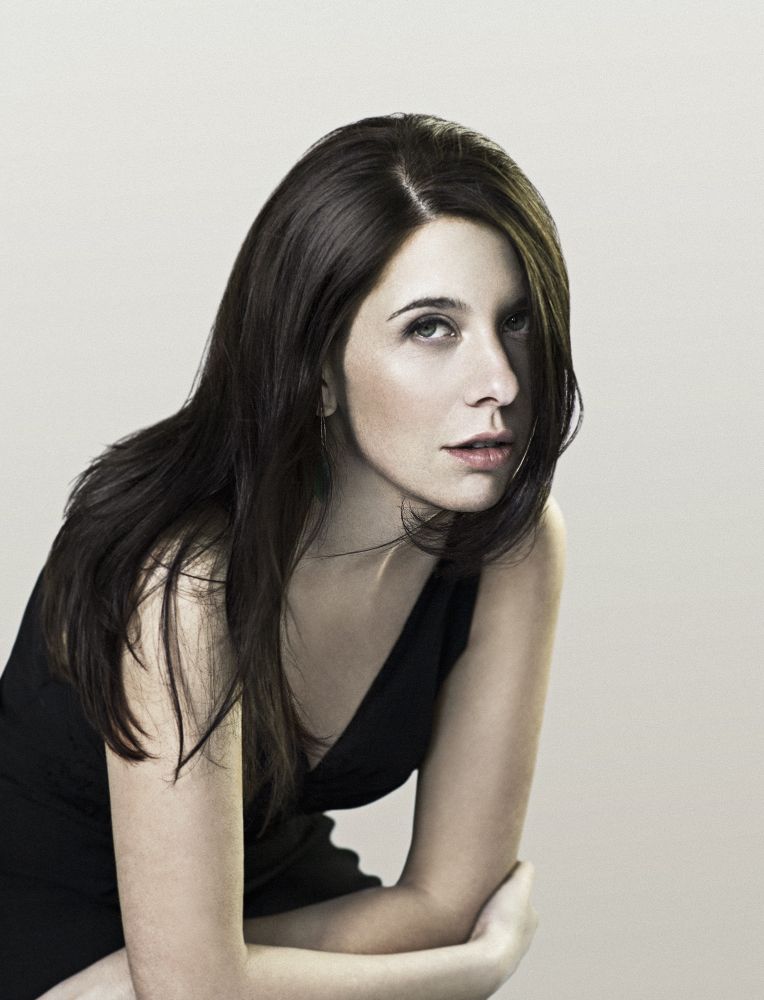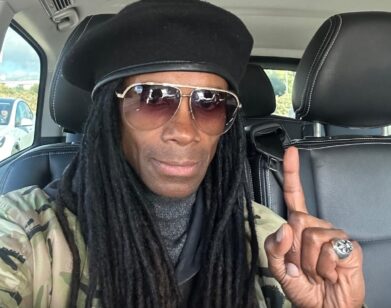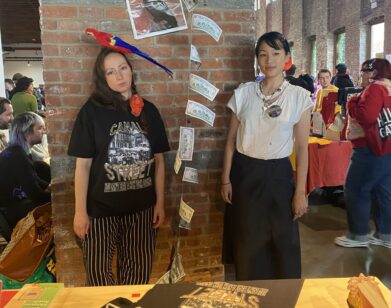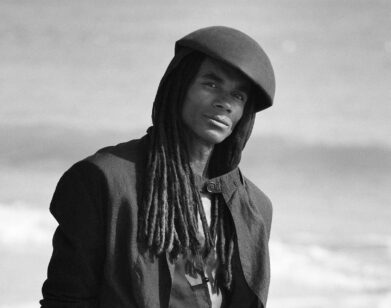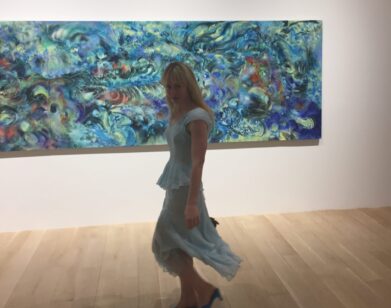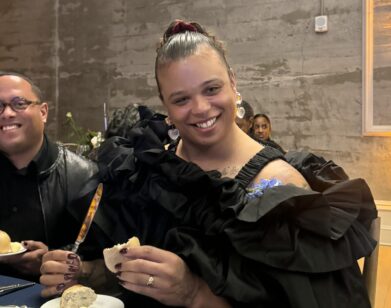The Trans-Generational Author
PHOTOS BY WENJUN MIAKODA LIANG.
“I’ve heard writers say that they get that gift where a story arrives fully formed,” says author Molly Antopol. “I’ve never had that. All the stories were hard.”
Now 34 and a professor at Stanford University, Antopol has been working on her debut collection of short stories, The UnAmericans (W.W. Norton & Company), for 10 years. There is a fluidity between the author’s world and that of her characters. While the stories are not autobiographical—none of the characters, she assures us, are based on ex-boyfriends or friends— Antopol’s personal history seeps into and informs each story. In The Quietest Man, a little girl “writes her way” into her favorite books, as Antopol used to when she was a child. In A Difficult Phase, a young writer close in age to Antopol begins a love affair with a slightly older widower. Some stories are set in Israel, where Antopol lives for four months out of the year. Others, such as Duck and Cover, are set in a Jewish communist community in Los Angeles during the ’50s, where Antopol’s grandparents resided. “I never planned to write those stories,” she explains. “I never thought about what I would write. I just come from such a big family of storytellers.”
There are no Raymond Carver-esque, sparse, two-page stories in Antopol’s collection, but each one ends before the reader is ready to let the characters go. “I really look up to writers who are able to write compressed, single-scene stories, where everything happens in a kitchen,” says Antopop. “But I just can’t think that way. For me it would be impossible to write a story where I didn’t know what someone’s parents did and what their grandparents did and who they used to date.”
Although The UnAmericans doesn’t come out until the end of the month, Antopol has already received a great deal of press and praise. Her book jacket is covered in quotes from authors like Peter Orner and Adam Johnson. At the end of last year, the National Book Foundation named her as one of their “Five Under 35.”
EMMA BROWN: It seems like there has been a recent resurgence of short stories. What made you choose the short story form?
MOLLY ANTOPOL: I’ve always loved short stories. Even before I was a writer I was reading short stories—there were certain writers where I just felt like they could do in a short story what so many writers needed a whole novel to do, and that was really inspiring to me. Alice Munro, I felt that way about from an early time. Grace Paley.
Raymond Carver had this quote that I loved about how he felt that a short story was the moment right before someone’s life was about to fall apart. You can’t really do that with a novel, but with a story you’re just left hanging.
BROWN: As a writer and a writing teacher, what do you try to pass on to your students?
ANTOPOL: I try to be supportive. People are going to bash you. You get rejected. It’s hard. I don’t really feel like that’s my place as the teacher. I think the most important thing is to figure out what they’re trying to do and turn them onto writers who are doing similar stuff. I think that’s something I can do more than anything else: get them to be big readers.
BROWN: When you’re reading so much fiction, do you find it difficult to stop other author’s voices from affecting how you write?
ANTOPOL: Yes. There are certain writers I can’t read when I’m trying to write because their voices are so distinct. Cormac McCarthy, he’s the most different writer from anything I’ve ever written, but there’s something about those really spare sentences that is just tough—it would be too much of an influence. Grace Paley is my favorite writer. Her stuff is so voice-driven, when I read her a lot I want to make [my writing] more voice-y and dialogue-heavy. I love a lot of stuff in translation and you can’t [always] tell if it’s a really great translation or not, and I can feel those bumps when I’m writing.
BROWN: Was it difficult to arrange the stories in The UnAmericans?
ANTOPOL: I thought about it a lot because the book kind of goes all over the place. When I was writing, it felt really important to me to feel like I could write from the point of view of a man or a woman, young, old, American, European, and Israeli. I felt like the only way I knew I would be finished with the book is if I knew I could do that. I was at an artist’s residency in Wyoming and I just put all the stories on the floor. I would stare at them and shuffle them and leave and come back. I did that for three weeks.
BROWN: I can never read my old interviews. Now that your book is coming out, are you able to re-read your stories?
ANTOPOL: I thought I would feel that way because I have a lot of writer friends who say that once the book is published they can’t read it. But there’s something about seeing them bound in a galley where I think, “That’s done. They exist and they’re finished and I just have to think about the next thing.” It’s more when I’m out in the world, I’ll have an experience with someone and I’ll be thinking about how to use language to make sense of it, and I realize I can’t do that with those characters anymore. I need to take those experiences to the new book.
BROWN: How do you write from the perspective of another gender? How do you get into the head of a 60-year-old man?
ANTOPOL: It’s actually easier for me. The story that was really hard for me was the woman who was close in age to me and a writer. I felt like I couldn’t see around her experience—I was too in it. Whereas with a lot of the men, once I get the voice, it just works. When I was writing, I kept thinking for each story: Who’s in the most complicated place in this situation? I want to write from their point of view and watch them get out of the hole that they’ve dug for themselves.
BROWN: One of my favorite stories was the one about the two Israeli brothers who are both in love with the same girl.
ANTOPOL: I had a visual in my head about these two brothers, the intimacy of these two guys fighting and what would happen if this once really powerful man wasn’t strong anymore? In an earlier draft, I let more happen with the narrator and the girlfriend. Then I thought it would be more interesting and realistic if it’s all about the possibility.
BROWN: What do you think makes something a good story?
ANTOPOL: The stories I love the most are where the author has a lot of empathy for everyone. The author loves their characters and takes their situations really seriously, and you feel like you’re just dropped into a different world. The moment a story works for me is when it feels like Method acting—if we’re sitting here and suddenly I start to imagine what the character would be doing in this situation. How would they respond?
BROWN: Some of your stories deal with members of the Communist party during McCarthyism. Today, communism seems sort of irrelevant.
ANTOPOL: That was one of the things that was really interesting in writing this book, thinking about how people had really risked their lives. My grandfather was in jail—what was that like for my mother, to grow up under so much surveillance? To realize it’s kind of lost relevance in the course of world events, what do you with that? What do you do if the thing that you’ve devoted your entire life to feels less meaningful at some point? It felt so poignant to me and so sad.
With the McCarthy-era stories, my family was very useful. But then I did a lot of research—the public library here, the one at Bryant Park, is really amazing. My grandfather has boxes and boxes of FBI files [on him] that are now available to the public. The locations where they were watching him are now wine bars, but they used to be communist meeting spots, so it’s really interesting to think about how quickly the city changes, and the politics of the city and the country. With the Israel stories, those took the least amount of research because I’m there and I’m close to a lot of people. There’s something interesting about being really intimate and familiar with Israel, but still being American—that really thin piece of glass between me and my experiences.
BROWN: Do you ever have anxiety dreams when you were writing?
ANTOPOL: [laughs] Absolutely. It feels so real and important, and when I tell it to a friend they’re just like, “Molly, that’s the most textbook thing I’ve heard in my life. You have a fear of exposure or a fear of criticism.” The fear, as I was writing, was that people would tell you short-story collections don’t sell, or people would say, “Oh, you’re writing stories. Can you turn one of your stories into a novel?” Which is the most frustrating thing to hear when you’re working so hard on the collection.
BROWN: Would you ever revisit any of these characters in a subsequent collection?
ANTOPOL: Maybe. I love it when writers do that. I love that feeling when a character appears later on and they’re doing something else or they’re a side character in a new story. One of the characters, the narrator of The Quietest Man, I kept thinking about him. He might come back. I was actually thinking about one of his colleagues from the underground newspaper.
BROWN: Do you get writer’s block?
ANTOPOL: Oh, yeah. I get really sad when I have writer’s block. I just feel blue and look around. The only way I’ve been able to deal with it is to treat it like a job and say, “I don’t get any sick days and I just have to do it every day.” The one thing that’s been useful is that if I’m really struggling with one story, it often feels very exciting to cheat on it with a new story. That’s actually how I wrote the whole book. I would be working hard on one story, I would get to a bump—something that I just couldn’t untangle— and then I would think, “It would be so fun to write about this totally different world.”
BROWN: Do you wait until end the end of a story to edit it? Or do you edit as you go?
ANTOPOL: I always tell my students to write the story all the way through, not to play with the language and fall in love with sentences that you then have to cut. [But] I actually find that really difficult to do; there’s something so demoralizing about looking at a pile of not very great sentences. As I ease into writing every morning, I tweak a sentence and then tweak a paragraph.
BROWN: I feel like I could never completely cut a sentence that I liked, but that just didn’t fit in the work. I would have to paste it into another Word document and save it, just in case.
ANTOPOL: Totally. I have a whole folder of these orphan sentences that I’ve spent all this time working on, and they don’t belong anywhere. They just sit there.
BROWN: What’s the best advice you’ve ever gotten?
ANTOPOL: I read an interview a long time ago with Paula Fox, who’s a writer I really admire, and she was talking about how truth is more important than fiction. What I took from that is that it is more important to just be as honest as I can about my characters than to write some really great sentence.
THE UNAMERICANS COMES OUT JANUARY 27 AND IS AVAILABLE TO PRE-ORDER ON AMAZON.
For more of our 14 Faces of 2014, click here.

